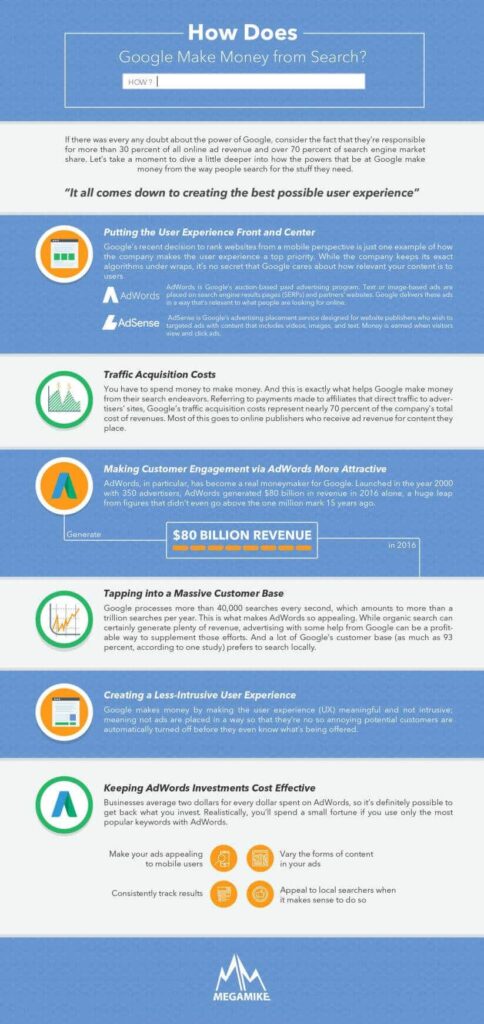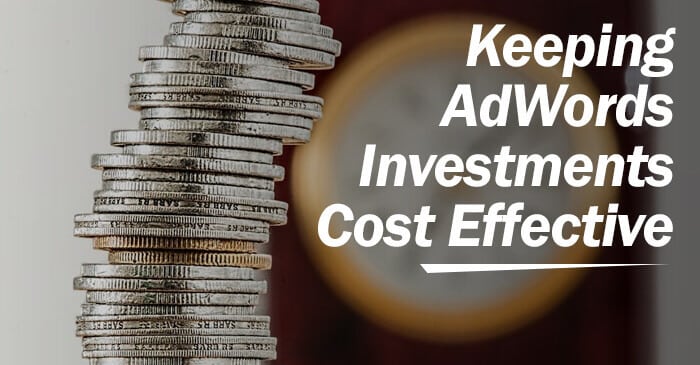How Does Google Make Money from Search?

If there was every any doubt about the power of Google, consider the fact that they’re responsible for more than 30 percent of all online ad revenue and over 70 percent of search engine market share. Let’s take a moment to dive a little deeper into how the powers that be at Google make money from the way people search for the stuff they need.
It all comes down to creating the best possible user experience.
Of course, the reasoning behind this is that happy searchers will keep coming back. And if you’re looking to boost your ROI from your online efforts, Google’s method of putting your message in front of the right eyes, known as AdWords, is worth exploring.
Putting the User Experience Front and Center

Google’s recent decision to rank websites from a mobile perspective is just one example of how the company makes the user experience a top priority. While the company keeps its exact algorithms under wraps, it’s no secret that Google cares about how relevant your content is to users. This is why they care about things like how accurately your meta descriptions match the actual content of your webpages.
Relevance is also determined by how long visitors stay on your site once they get there. Now factor in the fact that Google makes more than 90 percent of its money from advertising and it’s easy to see how user experience relates to how the company sells and distributes ads. Google primarily does this with two ad-based search engine marketing methods:
- AdWords: AdWords is Google’s auction-based paid advertising program. Text or image-based ads are placed on search engine results pages (SERPs) and partners’ websites. Google delivers these ads in a way that’s relevant to what people are looking for online.
- AdSense: AdSense is Google’s advertising placement service designed for website publishers who wish to targeted ads with content that includes videos, images, and text. Money is earned when visitors view and click ads.
Traffic Acquisition Costs
You have to spend money to make money. And this is exactly what helps Google make money from their search endeavors. Referring to payments made to affiliates that direct traffic to advertisers’ sites, Google’s traffic acquisition costs represent nearly 70 percent of the company’s total cost of revenues. Most of this goes to online publishers who receive ad revenue for content they place.

Making Customer Engagement via AdWords More Attractive
AdWords, in particular, has become a real moneymaker for Google. Launched in the year 2000 with 350 advertisers, AdWords generated $80 billion in revenue in 2016 alone, a huge leap from figures that didn’t even go above the one million mark 15 years ago.
Part of the reason for this is the consistent focus on the user experience that goes beyond AdWords to include any type of results displayed when doing a search. If you happen to an advertiser, your goal is to show up prominently on those search pages. With AdWords, you’re bidding on keywords that will likely make this happen.
Tapping into a Massive Customer Base
Google processes more than 40,000 searches every second, which amounts to more than a trillion searches per year. This is what makes AdWords so appealing. While organic search can certainly generate plenty of revenue, advertising with some help from Google can be a profitable way to supplement those efforts. And a lot of Google’s customer base (as much as 93 percent, according to one study) prefers to search locally.
It’s no coincidence that AdWords is also focusing more on local searches. According to one estimate, more than 60 percent of the consumers who interact with locally based pay-per-click ads use local info in those ads, meaning they find those ads relevant to their needs.
Creating a Less-Intrusive User Experience
Google makes money by making the user experience (UX) meaningful and not intrusive; meaning not ads are placed in a way so that they’re no so annoying potential customers are automatically turned off before they even know what’s being offered. Over the past few years, Google has been increasingly rewarding sites with good encryption, reputable links, and easy-to-use navigation features. So, it should come as no surprise that Google is more accommodating to advertisements that enhance the user experience by:
- Genuinely appealing to people who view them
- Using data to tailor ads based on receptivity and abandonment behaviors
- Presenting ads that lead to websites also designed to enhance the user experience and encourage conversions
Keeping AdWords Investments Cost Effective

Businesses average two dollars for every dollar spent on AdWords, so it’s definitely possible to get back what you invest. Realistically, you’ll spend a small fortune if you use only the most popular keywords with AdWords. “Insurance,” for instance, will cost you about $55. On the other hand, Google also gives you a lot of flexibility with you adjust your budgets for each campaign.
There are plenty of ways to boost your ROI with paid campaigns peppered with keywords that are less competitive yet still effective. With the tools Google provides, you can do things like narrow down keywords by geographic region and find out what terms your competitors may be overlooking. AdWords can also be highly cost-effective if you:
- Make your ads appealing to mobile users
- Consistently track results
- Vary the forms of content in your ads
- Appeal to local searchers when it makes sense to do so
Now that you know how Google makes money, the next step is use the company’s resources to generate revenue for your business.
One of the most effective ways to do this is to include some paid advertising with your organic search efforts. If AdWords is one of the ways you want to do this, keep your focus on the user experience and you’ll likely be rewarded with results that matter to you.
Google provides plenty of tools you can use to see what your competitors are doing and track results. And if you need some help sorting out the details, find a marketing professional you can trust to provide some much-appreciated guidance. AdWords isn’t likely to be your only source of online revenue, but it’s definitely one that can a reliable source of revenue — with the right strategy.
Is your online advertising and marketing centered around what your customers expect? What experiences have you had with AdWords? Feel free to share your thoughts and comments.
Other Ways Google Makes Money
There are plentiful ways that Google makes money beyond its search pages. They are one of the fastest growing companies in the world which means they have the man power and resources to invest in other areas of technology and innovation. Each and every time a search query is performed the need for search real estate increases.
Because Google dominates the market of search they are able to invest in mobile apps, their own operating system, music media (Google Play), their own mobile devices, and much more. Beyond Googles advertising revenue (Google Adwords), they have and will continue to be the primary source for searchers and other media on the web today.
Where do you see Google making money in the near future? Is it in different ways of advertising via unique publishing platforms? Or, do you think they will own the next big thing in accessible technology?



Orlando web design agencies share their knowledge at the WordPress user group of Orlando
February 7, 2018 @ 2:34 am
[…] Michael L. Brown Jr. If you are interested in learning more about SEO and topics like “How does Google make Money“, you should visit his site at […]
The Complete Guide To Use AdWords Extensions For Apartment PPC Marketing | StrategyBeam
February 20, 2018 @ 4:52 pm
[…] your PPC ads to ensure you capture as many qualified clicks as possible. This is one way that your AdWords account can generate more revenue and beat your […]
Orlando web design agencies share their knowledge at the WordPress user group of Orlando
March 29, 2019 @ 4:16 am
[…] my friend Michael L. Brown Jr. If you are interested in learning more about SEO and topics like "How does Google make Money", you should visit his site at […]